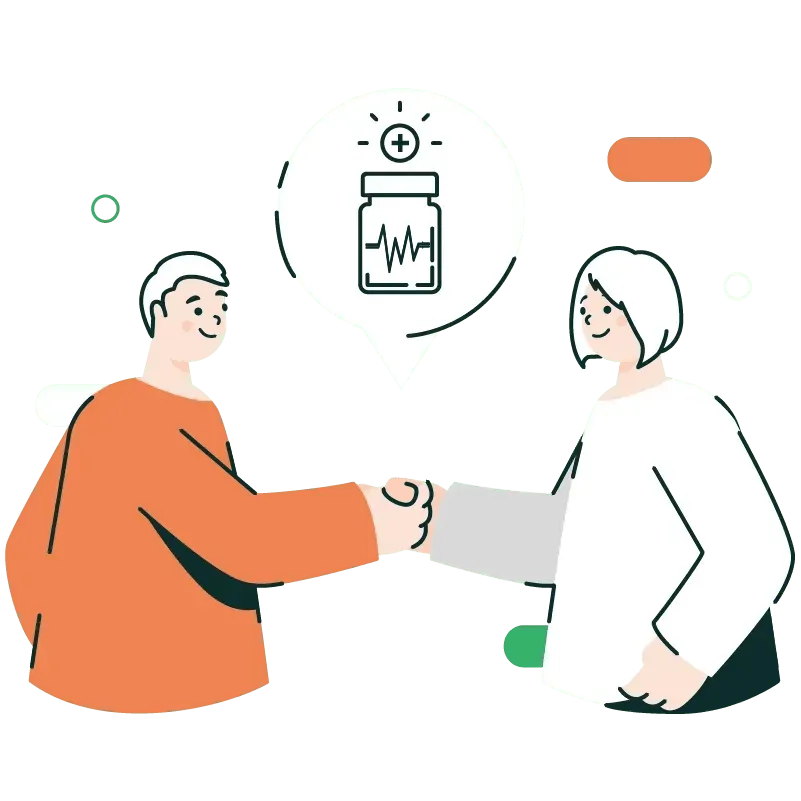FREE PRE-SCREENING
Online Ketamine Therapy | Depression Treatment Tele-MAT
Affordable
Medication-Assisted Treatment is just one click away.
How To Get A Ketamine Prescription In Kentucky?
From your initial physician consultation to scheduling ketamine treatment sessions, everything is online while harmonizing with your schedule and life. To book an appointment and start your ketamine treatment, follow these steps:
Start With Filling Out the Consultation Form

Attend Your Appointment and Get Evaluated

Get your Ketamine Prescription Online.

What is Ketamine?
Types of Ketamine Therapy in Kentucky
Ketamine Treatment for Depression
When Can I Use Ketamine?
Ketamine for Anxiety
Ketamine for OCD
Ketamine for PTSD

Ketamine for Bipolar
Ketamine for Chronic pain
Ketamine for Status Epilepticus


Benefits of Ketamine
- The use of Ketamine can replace thoughts of suicide with thoughts of hope.
- It revs neurons by interacting with NMDA (N-Methyl-D-aspartic acid) receptors for new cell growth.
- It calms your mind and reduces severe or chronic pain.
- It decreases the need for narcotic painkillers.
- It works quickly, within hours, and continues to work even after being metabolized.
- It also improves symptoms of other mental health conditions, including PTSD, anxiety, bipolar, and OCD.
- You are not at risk for developing an addiction because your psychiatrist prescribed only small doses.
Is Ketamine Safe?
Since its inception, Ketamine has been used safely in millions of patients. It is also one of only two anesthetics listed as an “essential drug” by the World Health Organization (WHO). Medical studies have also shown that ketamine treatment has improved symptoms of depression, PTSD, OCD, anxiety, bipolar disorder, and chronic pain safely, with approximately 70–80% of patients responding to ketamine treatment.Is Ketamine Therapy In Kentucky Legal?
We get it. What are you going through!

Book Your Online Consultation With Our Tele-MAT Professionals
We understand your struggle; that’s why we are here for help!
Got any Queries?
Contact us any day, anytime. Our Customer Care Executive team is happy to help you.
Call us at +1 (888) 281-8758
Don’t overthink and book a consultation. Maybe we can help!
Frequently Asked Questions
We understand your struggle; that’s why we are here for help!
Does Insurance Cover Ketamine Therapy Kentucky?
Ketamine therapy Kentucky may not be covered by insurance because of its off-label use. It’s better to check with your insurance provider before starting the treatment. You also need to check with your Ketamine Kentucky clinic.
Is The Consultation Free?
How Long Does A Session Take?
How Is The Ketamine Therapy Administered In Kentucky?
Ketamine infusion therapy is administered via a needle and IV bag. Your doctor closely monitors your infusion and makes a report of it so that they can monitor the progress and side effects of the ketamine infusion.
Does Ketamine Work When Given Orally Or Nasally?
Ketamine is absorbed by the body very differently when taken orally or nasally and is not as effective for depression. But in both cases, Ketamine is effective whether you take it nasally or orally. The effect time will vary on a minor scale, but all forms are reliable.
What Is The Process For A Ketamine Kentucky Treatment?
The process of Ketamine is simple. Most patients report significant improvement by the third infusion, and more than 70-80% report remission at the fourth infusion. In addition, some patients initially become aware of the improvement in mood after only one infusion.
What Is Involved In A Ketamine Infusion?
Patients will usually receive ketamine infusion therapy in a private room with medical equipment for monitoring heart rate, pulse, blood pressure, and many others. A doctor can monitor a patient’s vital signs. Most patients report a peaceful and relaxing experience. Patients, on average, should expect to spend 60 to 80 minutes in the clinic, allowing for the check-in procedure, the active phase of infusion, and recovery time.
Is Ketamine Safe Or Ineffective?
Ketamine is a safe treatment but may be ineffective in patients with uncontrolled blood pressure, unstable heart disease, active substance abuse, or active psychotic (hallucinations or delusions) symptoms.
